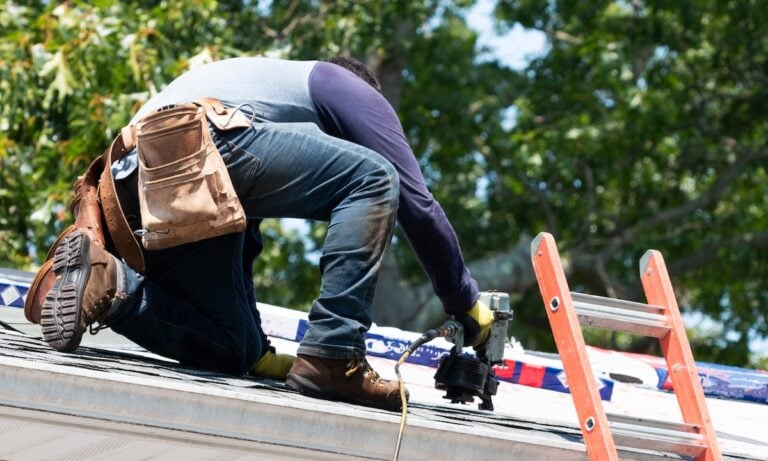Knowing the right questions to ask a contractor before they start work can save you time, money, and major headaches. Whether you’re hiring someone to repair your roof, replace siding, or build a new deck, you need more than just a handshake and a price.
In this blog, we’ll walk you through:
- The most important questions to ask: So you can avoid delays, cost overruns, and disputes.
- Why each question matters: And what kinds of answers should raise red flags.
- How to compare contractors: So you can hire with confidence and clarity.
Let’s dive into what you should ask before signing any contracts or handing over a deposit.
👉 Why Vetting Your Contractor Matters
Hiring a contractor without doing your homework can lead to poor workmanship, project delays, or even unfinished jobs. Asking the right questions protects your investment and helps you understand exactly what to expect before the first tool comes out.

Communication Is Everything
Before work begins, you should already feel comfortable asking questions and getting clear answers. Good communication early on sets the tone for the rest of the project.
- Contractor responsiveness: If they’re slow to reply or vague before the job, it may get worse once they start.
- Clear documentation: Estimates, materials, and timelines should all be in writing.
Not All Contractors Are Equal
Even if two contractors offer the same services, their approach, training, insurance, and values may vary widely.
- Credentials matter: Licensing, bonding, and insurance are non-negotiable.
- Reputation tells the story: Online reviews, referrals, and portfolio examples help verify quality.
👉 7 Questions You Should Always Ask
Before signing any agreement, ask these seven critical questions. The answers will give you the insight needed to make an informed hiring decision.
1. Are You Licensed, Bonded, and Insured?
This question isn’t just about credentials—it’s about protecting yourself if something goes wrong.
- License: Confirms they’re legally allowed to perform the work in your area.
- Bond: Provides financial protection if the contractor fails to finish or meet obligations.
- Insurance: Covers injuries or property damage during the project.
If they can’t provide proof of all three, that’s a major red flag.
2. Can You Provide References From Recent Projects?
A trustworthy contractor should be happy to connect you with past clients.
- Ask for 2–3 references: Recent jobs are the most relevant.
- Look for similar projects: If you’re getting a new roof, ask to speak to roofing clients.
- Follow up: Don’t just ask—actually call or email the references.
Bonus tip: Look for contractors with before-and-after photos or video walkthroughs.
3. What’s Included In Your Estimate?
Not all estimates are created equal. Some contractors provide vague totals that leave out important details.
- Labor and materials: Ensure both are clearly itemized.
- Permit fees and cleanup: Ask if those are included or extra.
- Change order policy: How will additional charges be handled?
Understanding what’s covered helps avoid budget surprises.
4. What’s Your Project Timeline?
You should have a clear understanding of how long the project will take, from start to finish.
- Start and end dates: These should be defined and realistic.
- Contingency plans: Ask what happens if there are delays due to weather or supply issues.
- Daily work hours: Know what times the crew will be on-site.
This helps you plan around the work and sets expectations from day one.
5. Who Will Be On-Site Each Day?
Knowing who’s actually doing the work is key to quality and accountability.
- Will the owner or manager be present?: If not, who is the project lead?
- Is the work subcontracted?: Understand whether subcontractors will be used and how they’re supervised.
- How can you reach someone?: You should always have a direct point of contact during the job.
Consistency in who’s showing up impacts both efficiency and communication.
6. How Do You Handle Permits and Inspections?
Even if you’re hiring a contractor, you may still be legally responsible for making sure the work is permitted.
- Ask who pulls permits: In most cases, the contractor should handle this—not you.
- Know the inspection schedule: Larger projects may require multiple inspections.
- Compliance assurance: Make sure they follow local codes and are familiar with your city’s requirements.
If a contractor hesitates about permits, it’s a red flag.
7. What Warranties or Guarantees Do You Offer?
Any contractor worth hiring should stand behind their work and the products they use.
- Workmanship warranty: Covers labor and installation errors.
- Manufacturer warranty: Covers defects in materials like shingles or siding.
- How long and what’s covered: Ask for the terms in writing.
Bonus: Ask how warranty claims are handled and how quickly issues are addressed.

❗️ More Tips For Choosing The Right Contractor
Beyond asking questions, there are a few more things you can do to ensure you’re choosing the best person for the job.
Compare More Than Price
Low bids are tempting, but they often leave out important services or use lower-quality materials.
- Look for value, not just cost: A higher bid may include cleanup, better materials, or longer warranties.
- Ask why bids differ: If one contractor is significantly cheaper, find out why.
Review Their Contract Carefully
Before work begins, you should receive a contract that includes all terms and expectations.
- Scope of work: Outlines exactly what the contractor will do.
- Payment schedule: Avoid contractors who ask for full payment upfront.
- Dispute resolution: Good contracts outline how issues will be resolved if something goes wrong.
Never start a project without a signed contract that protects both parties.
Check Online Reviews and Ratings
You can learn a lot from the experiences of other homeowners.
- Look for consistency: One bad review isn’t a dealbreaker, but patterns of complaints are.
- Responded reviews matter: Contractors who respond professionally to reviews show they care.
- Look beyond star ratings: Read the details to see how the contractor communicates and performs.
🚩 Red Flags To Watch Out For
Keep an eye out for warning signs that a contractor may not be trustworthy or professional.
- No written contract: Verbal agreements aren’t enough.
- Cash-only payments: Legitimate contractors usually accept checks or cards.
- High-pressure sales tactics: You should never feel rushed into a decision.
- Lack of local references: Contractors should have a track record in your area.
If your gut is telling you something feels off, it’s okay to keep looking.

🤝 Choose With Confidence
Asking the right questions to ask a contractor before they start work is one of the smartest things a homeowner can do. It gives you a window into their professionalism, process, and reliability. You’re not just hiring someone to complete a job—you’re trusting them with your home.
At Boss Exteriors, we welcome questions because we believe in transparency, honesty, and doing the job right. Our team is fully licensed, insured, and committed to delivering the best possible service from start to finish. Whether you need roofing, siding, or exterior upgrades, we’re here to guide you every step of the way.
Ready to talk to a contractor who has nothing to hide? Contact Boss Exteriors today to schedule your evaluation.




